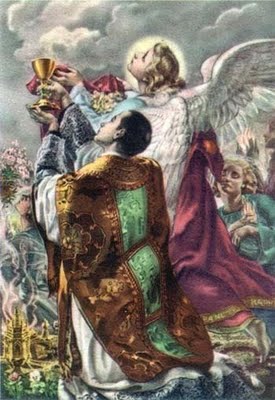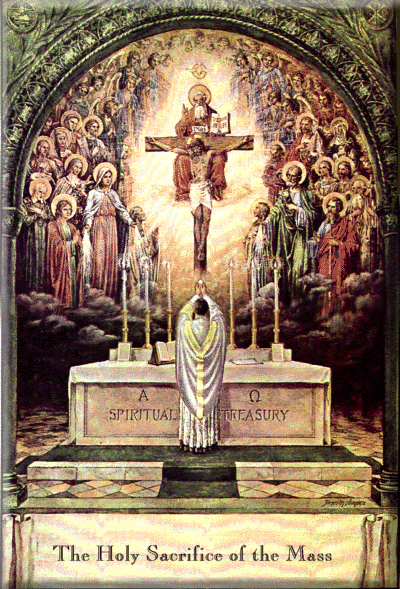 From a priest…
From a priest…
QUAERITUR:
I know that Canon Law currently permits, although discourages, a priest to say a Mass alone (i.e. without server or faithful). I’ve heard that previously, it was forbidden under penalty of mortal sin to say Mass alone. I’m not sure about the relation between the new Code of Canon Law and Mass in the Extraordinary Form. If a priest has just reason, is he now permitted to say Mass in the Extraordinary form alone? I’m currently a transitional deacon who hopes to say the EF, but may not have the opportunity to do so publicly too much. If possible, I would occasionally say it in private to become more comfortable with it until the time comes when I can say it publicly.
Thanks for asking.
Yes, Father, you can say Mass in the Extraordinary Form alone, that is, even without a server. It is not a sin. Sometimes we make a distinction between Mass sine populo (which has a server but no congregation) and the Missa solitaria (which means you are on your own).
The Code of Canon Law can. 906 says that priests can say the Missa solitaria for a just reason.
“Can. 906 – A priest may not celebrate the Eucharistic Sacrifice without the participation of at least one of the faithful, unless there is a good and reasonable cause for doing so.”
Can. 904 urges priests to say Mass daily. So, desiring to take that canon seriously is enough of a reason to say the Missa solitaria. It is enough of a just reason to desire to say Mass for the good of souls for whom they are celebrated. It is a good enough reason if you simply want to say Mass, as the priest/victim that you are as alter Christus at the altar which is Calvary.
If you are by yourself, there are a few things to attend to on your own.
First, you make your own responses. However, during the prayers at the foot of the altar you don’t do the Confiteor twice. Do it once and leave out “vobis, fratres… vos, fratres”. You are not talking to other people, after all. In the absolution change misereatur vobis to nobis. In response to your own Orate, fratres, say manibus meis.
You have to move the book yourself to the Gospel side. Don’t genuflect at the middle, but bow your head. Then I go back to the center for the prayers as usual. Take the stand with you at the end for the Communion antiphon. Before Mass, pour a little (unblessed) water into the ablution bowl for your Lavabo so it will be there for you when you need it. As far as turning around for Dominus vobiscum… which you should not change… turn around for it or not, as you please. If you are just learning the Mass, then turn around so you can learn to do it correctly.
Force yourself not to rush or to cut corners.
Remember, you are never truly alone when you say Mass.
You are thronged about with myriad upon myriad of Holy Angels. Your Mother, Queen of Priests, attends. The saints gaze. The Poor Souls hang upon your every word and gesture.

The moderation queue is ON.


































“Remember, you are never truly alone when you say Mass.You are thronged about with myriad upon myriad of Holy Angels. Your Mother, Queen of Priests, attends. The saints gaze. The Poor Souls hang upon your every word and gesture.”
Yes. Wonderful. This is very much what i tell my very young children and, of course, they have no problem grasping that truth.
[I think many small children can see them.]
Perhaps the priest-questioner might find someone who is interested in the TLM who would like to attend his private Masses and at least say (or learn to say) the responses from the pews. (They would both be learning!) Yes, I know it’s a long shot in thinking someone is out there eagerly awaiting an invitation…but you never know!
In our case we were most fortunate to have one among us who had studied Latin and knew the responses. He also knew when to ring the bells.
I hope the questioner will persevere. There are people out there praying for a priest like him. I hope they find each other!
With respect to the rubrics, are there any other changes made when offering the daily requiem Mass?
[Not really. None other than the usual for a Requiem.]
As a priest in graduate studies, without a parish assignment, I have often celebrated Mass alone. Not long after my ordination, I also began celebrating the EF privately on a regular basis for the very reason that the questioner mentions – i.e., to become more comfortable with the older form of the Mass and thus to be better prepared to celebrate it publicly.
This is a video of a hermit priest offering the “Tridentine Mass” alone without a server.
https://www.youtube.com/watch?v=P7q08KIFsH0
Not a priest but found this very informative. And the last paragraph brought me to tears.
A “good and reasonable cause” is simply that the priest wants to say Mass.
[Yes.]
Several years ago, we two “elder” ladies were saying our thanksgivings after Mass. One of our priests had not said his private Mass for the day. He went to the back of the church where a couple of men were and asked if they could do the responses. They were not able. My friend and I were in a front pew. Father asked us if we could help him out. Having been raised in the era when we knew the TLM backwards and forwards, had studied Latin in school, and were perfectly able to follow the Mass, we recited all the server parts (including Confiteor at the foot of the altar and before Communion) from that front pew.
I knew a priest who, when he said Mass alone, would pray for an increase in vocations.
If Father Zuhlsdorf is correct that, “It is enough of a just reason to desire to say Mass for the good of souls for whom they are celebrated,” that makes canon 906 virtually meaningless. What then was the intention of the legislator in decreeing that, “A priest may not celebrate the Eucharistic Sacrifice without the participation of at least one of the faithful, unless there is a good and reasonable cause for doing so”?
[We live with tensions and ambiguities in life. Roll with it. And remember a chief interpretive principle of canon law: odiosa restringenda, favorabilia amplianda.]
Thank you, Fathers, asking and answering!
It is a subject that I have long wondered about, without trying to investigate.
Thanks, too, to JMGeork!: priest-hermits is a context where I have encountered the subject, more than once.
I can imagine that the Missa solitaria is consuetudinal since the origins of monasticism – if not since the time of persecutions. (I wonder if, through the course of the history of the Church, monks have often become priests before becoming hermits, in order so to partake of that distinct never being alone at Mass?)
I would say that many good priests say Mass alone when they go on vacation, particularly if they are in remote areas. I have gone on vacation with a group of Catholic friends and we have been fortunate to have a good priest friend join us. This good priest will say daily Mass for our group, and he takes the time every day to pray his prayers throughout the day from his breviary. When we go out to eat, we will all say grace together in a restaurant (and even in the dining room on a cruise ship), and he is not ashamed to wear a clerical shirt and black slacks at a restaurant.
This also reminds me that several dioceses encourage seminarians to attend daily Mass while on vacation. If a seminarian is visiting family, some vocation directors encourage them to assist the local priest at Mass. As a layperson, I am glad when good priests emphasize that during the summer months Catholics do not take a vacation from Mass.
“A good and reasonable cause for doing so”
[As you briefly touched on Father]……How about for the aid of the Holy Souls in Purgatory? The Most Holy Eucharist is the source and summit of our faith, the Holy Mass is the highest form of prayer, and the best means to relive the poor souls.
Anyone who disagrees or thinks otherwise, tell that to Pope St. Gregory the Great, St. Nicholas of Tolentino, and St. Padre Pio, among many others.
At our FSSP parish back in November, we had a Sung High Mass at the main altar, with about 7 altar boys and then at the side altars we had two low Masses being said. All three were Requiem Masses. Not sure where they came up with three sets of black vestments. It was beautiful.
[I think many small children can see them.]
My wife and I believed that our daughter could when she was younger, she would point a lot at the altar during and after the Consecration.
The better question than can a priest celebrate mass alone would be, does it make any sense to celebrate mass alone. Whether in the reformed rite or the unreformed rite to me the answer is, “not really,” since it it a clear violation of the dialogical or communal nature of the liturgy. [Imagine our surprise. No, that can’t be right. It is better that Masses be said than not be said. It is better for all involved. And, all involved is always the whole Church. The communal sense of the Church is always manifest in every Mass, whether many, few or none are there other than the priest. Priests who say the class “intention” prayer before Mass know and never forget this: Ego volo celebrare Missam iuxta ritum sanctae Romanae ecclesiae, ad laudem omnipotentis Dei, totiusque ecclesiae triumphantis, ad utilitatem meam, totiusque ecclesiae militantis, pro omnibus qui se commendaverunt orationibus meis in genere et in specie, ac pro felici statu sanctae Romanae ecclesiae. … I intend to celebrate Mass according to the rite of the holy Roman Church, to the praise of the almighty God and of the whole Church triumphant, for my benefit and that of the whole Church militant, for all who have commended themselves to my prayers in general and in particular, and for the happy estate of the holy Roman Church. Happy New Year.]
frjim4321 wrote:
“The better question than can a priest celebrate mass alone would be, does it make any sense to celebrate mass alone. Whether in the reformed rite or the unreformed rite to me the answer is, “not really,” since it it a clear violation of the dialogical or communal nature of the liturgy.”
With all due respect, frjim4321, this might be true if the Mass were simply a “dialogical meal” or a symbolic commemoration of the Last Supper. But if the Mass is the Eternal Sacrifice of Our Lord on Mt. Calvary, made present in an unbloody manner through the Sacrament of Holy Orders — a Sacrifice that brings graces and mercy into the world in the here-and-now and applies those graces to souls today — then yes, it does in fact make sense that a Priest celebrate Mass even when alone or on his “day off,” as a sacred duty that he is called to fulfil by virtue of his priestly ordination.